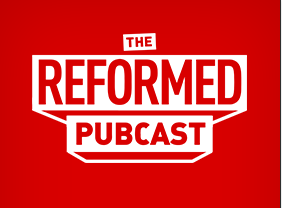THere be severall opinions about the Covenant of Works, and the Covenant of grace, to the great disturbance of many Christians; some hold that there be foure Covenants, two of Works, and two of Grace; the two first, one with Adam before . . . Continue reading →
covenant of grace
The New Covenant: A Revision And Expansion Of The Abrahamic
Jesus’ new covenant is not only a revision of the Abrahamic covenant but also an incorporation of a new body of people. This new covenant is said to be for all who believe in Jesus–not only believing Jews but also believing Gentiles. . . . Continue reading →
Boston On Works And Grace In Galatians 4
Ver. 24. Which things are a typical history; for these two women represent the two covenants, with the churches thereto adhering respectively; the one from Mount Sinai, to wit, the covenant of works, which was given there, and where the Jewish synagogue, . . . Continue reading →
Brakel: If You Don’t Understand The Covenant Of Works You Probably Don’t Understand The Covenant Of Grace Either
Whoever errs here or denies the existence of the covenant of works will not understand the covenant of grace.—Wilhelmus à Brakel. Continue reading →
Buchanan: Moses Was An Administration Of Grace And A Republication Of The Law
For if the inheritance be of the law, it is no more of promise: but God gave it to Abraham by promise.’ If it was ‘by Promise,’ then it was ‘by faith,’ for faith only receives the Promise; if it was by . . . Continue reading →
A Uniform Concept Of Covenant Faithfulness For Adam, Israel, & The New Covenant People
Mr. Shepherd rejects not only the term ‘covenant of works’ but the possibility of any merit or reward attaching to the obedience of Adam in the creation covenant. He holds that faithful obedience is the condition of all covenants in contrast to . . . Continue reading →
The Distinction Must Be Maintained
The two covenant scheme of the Westminster Standards has been absolutely essential in combatting the Neonomianism of both Norman Shepherd and the Federal Vision, not to mention Roman Catholicism. There are, of course, matters in which the two covenants are similar (they . . . Continue reading →
Witsius: Don’t Confuse The Covenant Of Works With The Covenant Of Grace
XXV. Such a perfect observance of the laws of the covenant, up to the period which God had fixed for probation, had given man a right to the reward. Not from any intrinsic proportion of the work to the reward, as the . . . Continue reading →
Berkhof: Christ Met The Condition Of The Covenant Of Works
3. BASICALLY, THE COVENANT OF GRACE IS SIMPLY THE EXECUTION OF THE ORIGINAL AGREEMENT BY CHRIST AS OUR SURETY. He undertook freely to carry out the will of God. He placed Himself under the law, that He might redeem them that were . . . Continue reading →
Irish Articles (1615): The Covenant Of Law, Christ’s Merits, And Grace To Sinners
21. Man being at the beginning created according to the image of God (which consisted especially in the wisdom of his mind and the true holiness of his free will), had the covenant of law engrafted in his heart, whereby God did . . . Continue reading →
A Brief History Of Covenant Theology
The roots of Reformed covenant theology are as deep as the Christian revelation and tradition is old. Its importance to the Reformed faith cannot be overstated. The great Princeton theologian, B. B. Warfield called federal (covenant) theology, “architectonic principle” of the Westminster . . . Continue reading →
On The Reformed Pubcast Discussing Covenant Theology
Covenant theology is sometimes regarded and presented by American evangelicals as an idiosyncratic, mysterious, even esoteric way to read Scripture. Of course, from a historical and biblical perspective, it is nothing of the sort. Much of what the Reformed began to teach . . . Continue reading →
Heidelberg 126: Justified Sinners Pray For Forgiveness Of Sins
One of the most persistent temptations Christians face is that of turning the covenant of grace into a covenant of works. As we pray we must always be reminded that we, who trust in Jesus Christ as our substitute and Mediator, are . . . Continue reading →
Resources On Conditions In The Covenant Of Grace (Updated)
Some thoughts relative to the current discussion about the nature of conditions in the covenant of grace: First, we cannot get this right unless we distinguish between the covenant of works and the covenant of grace. Part of the problem in this . . . Continue reading →
John Brown of Haddington On Conditions In The Covenant Of Grace
When condition is improperly taken, and signifies no more than what particular duties as performed must, in the order of nature, precede the enjoyment of particular promised benefits, many things may be called conditions; for holiness must precede eternal happiness…. True repentance . . . Continue reading →
The Synod Of Dort On Election, Conditions Of Salvation, And Fruit (1)
The Reformed churches have endured discussions and disagreements about salvation (justification, sanctification, and deliverance from the wrath to come) before. Beginning in the late 16th century a Reformed minister in Amsterdam began offering significant revisions of the Reformed understanding of Scripture. Early . . . Continue reading →
An Important Distinction Between Kinds And Functions Of Conditions
When we use the word “condition,” the first sense that probably comes to mind, in English usage, is the first definition offered by the Oxford English Dictionary: “convention, stipulation, proviso.” There is another sense to the word, however, as it was used . . . Continue reading →
Theological Error Seeps In
Years ago, in the second house in which Mrs Heidelblog and I lived, water seeped into the basement every time it rained and it rained frequently. As the ground became soaked water would push in and up through the basement. We had . . . Continue reading →
The Abrahamic Covenant Unifies Redemptive History
During our senior year in high school (1978–79) three of us went to lunch. Our public high school had an open campus, meaning that we were permitted to come and go so long as we attended classes. We piled into a friend’s . . . Continue reading →
Witsius On What “I Will Be Your God” Means
That expression, to be God to any, in its full import, includes life eternal, For, when God becomes the sinner’s God, he then becomes to him what he is to himself. But, what is he to himself? Doubtless, the fountain of eternal . . . Continue reading →






